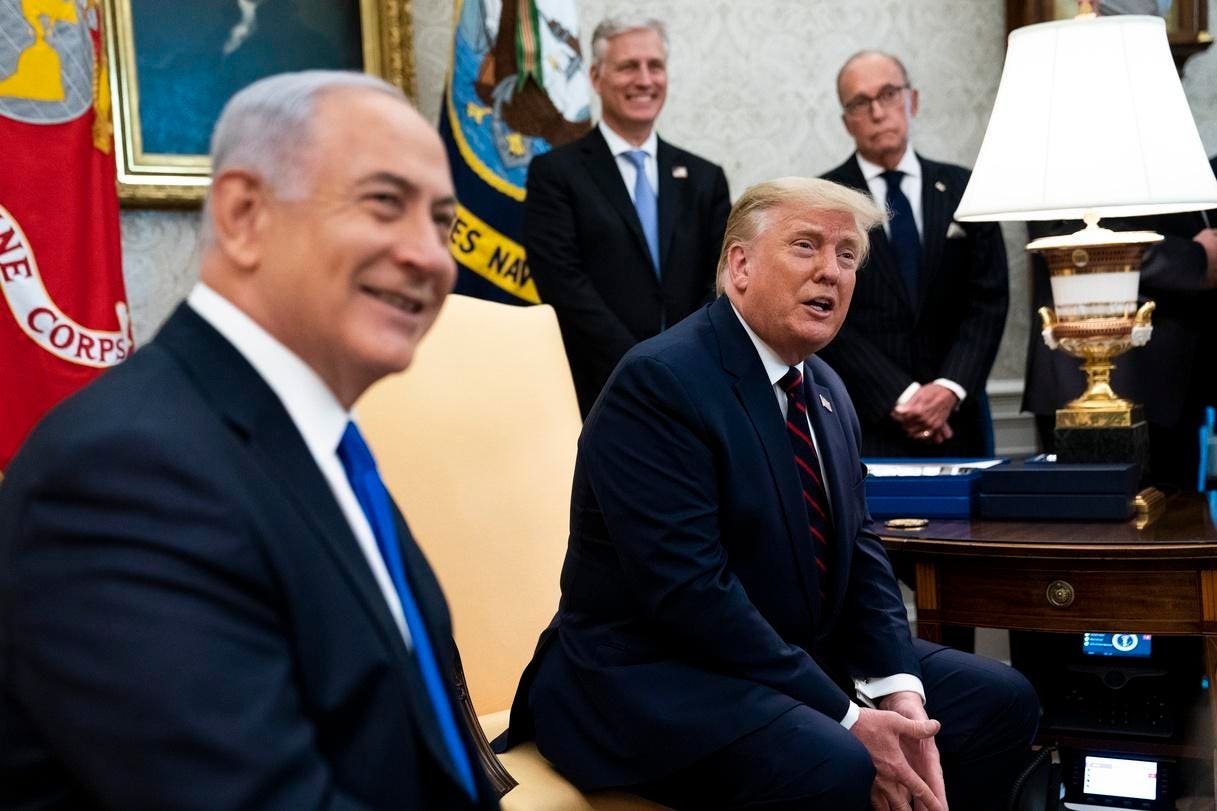WASHINGTON, DC – SEPTEMBER 15: U.S. President Donald Trump and Prime Minister of Israel Benjamin … [+] Netanyahu participate in a meeting in the Oval Office of the White House on September 15, 2020 in Washington, DC. Netanyahu is in Washington to participate in the signing ceremony of the Abraham Accords. (Photo by Doug Mills/Pool/Getty Images)
With former President Donald Trump now elected as the next American president, attention shifts to his Middle East policies and the implications for Israel’s complex relationship with Russia. It’s relevant, given the context of the war in Ukraine and Russia’s partnership with Iran, which poses an existential threat to Israel.
But it’s not straightforward: Russian President Putin and Israeli Prime Minister Netanyahu have formed a bond partly centered on their energy trade ties. Indeed, Russia supplies some oil to Israel, although its primary suppliers are Azerbaijan and Kazakhstan.
The signing of the Abraham Accords in September 2020 significantly altered the dynamics in the region, potentially decreasing Israel’s dependence on Russian oil. This agreement, involving Israel, Bahrain, and the United Arab Emirates, could provide Israel with a new source of oil. The nations have historically maintained informal trade relations, and this treaty formalizes those ties while including a security protocol.
The UAE and Israel have deep trade ties, strengthening their friendship. Saudi Arabia observes closely from the sidelines, while Oman, Morocco, and Kuwait may eventually join. Together, these countries form a defensive alliance against Iran, threatening regional stability.
“These countries have so many common interests,” said Bruce Gurfein, chief executive of the Dubai-based investment fund Connect LLC, in an interview. “They started dating, and now their relationship is public.” Gurfein has spent three decades facilitating business deals amongst the Middle Eastern nations, noting that the Arabic countries have welcomed him with open arms.
Moreover, Israel has long-standing energy ties to Egypt and Jordan, centered on natural gas; Israel supplies both countries from its offshore fields in Leviathan and Tamar. These business links are building a formidable fellowship.
Russia and Israel maintain a pragmatic relationship for several reasons. Approximately 1.5 million Russians reside in Israel, creating a cultural link President Putin acknowledges and respects. Geopolitically, Russia supports Syria, which has been a long-time adversary of Israel. However, Russia permits Israeli airstrikes on Syrian-Iranian targets within Syria, provided these strikes do not affect Russian ground assets.
Iran Complicates The Matter
SAMARKAND, UZBEKISTAN – SEPTEMBER 15: (——EDITORIAL USE ONLY MANDATORY CREDIT – “PRESIDENCY OF RUSSIA … [+] / HANDOUT” – NO MARKETING NO ADVERTISING CAMPAIGNS – DISTRIBUTED AS A SERVICE TO CLIENTS——) Russian President Vladimir Putin (R) meets with Iranian President Ebrahim Reisi (L) within the Shanghai Cooperation Organization (SCO) Summit in Samarkand, Uzbekistan on September 15, 2022. (Photo by PRESIDENCY OF RUSSIA/Anadolu Agency via Getty Images)
That said, the situation is complicated by Iran supplying Russia with drones for its war in Ukraine, which is putting a strain on the “deconfliction” agreement between Russia and Israel.
Beyond security, Russia and Israel have economic connections, especially in trade and technology. However, Russia’s war on Ukraine challenges the relationship. And now the war between Israel, Hamas, and Hezbollah is further muddying the waters, although that war has distracted the world’s attention from Ukraine.
Now, the pressure is on President-elect Trump to walk this tightrope—to ensure a stable Mideastern energy policy while securing Israel’s borders and managing Russia’s geopolitical aspirations.
According to the Jerusalem Post, Israeli Defense Minister Israel Katz—the former energy minister —has called on the country to increase natural gas drilling in the Mediterranean Sea. This quest is at odds with the country’s desire to cut greenhouse gas emissions and lead the world in meeting the goals of the Paris Climate Agreement.
“Everyone in the region and the world wants to be connected with Israel because of natural gas,” he said. “Our ability to export natural gas is a tremendous strategic asset that strengthens Israel’s position in the region and the world.” The minister has also said that Israel wants to preserve its relationship with Russia, given its influence in Syria, where it has serious security concerns.
The paper reports that Israel has 1,000 billion cubic meters of natural gas reserves in its waters. In addition to sending fuel to Egypt and Jordan, Israel exports about $236 million worth of goods to Egypt and buys agricultural and chemical products from Egypt. Furthermore, it provides Jordan with 50 million cubic meters of water annually. Jordan, meanwhile, sells solar power to Israel.
Trump must navigate a delicate balance. Trump has linked arms with Netanyahu, insisting Israel’s security comes first. He has also praised Russian President Putin. Therefore, he may see energy as a vehicle to build connections and stabilize the wars in Gaza and Ukraine.
While the United States, under President Biden, and the international community have spearheaded oil and gas sanctions against Russia, that may change under Trump. Witness Israel’s partnership with Egypt and Jordan and the success of the Abraham Accords. Minister Katz told the Jerusalem Post that Israel could use natural gas to stabilize the region.
It’s hard to hate someone after shaking hands and breaking bread with them, which may underlie Trump’s potential energy and foreign policy—easier said than done, considering the complexities of both wars.
